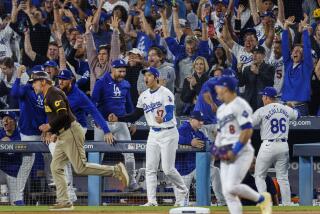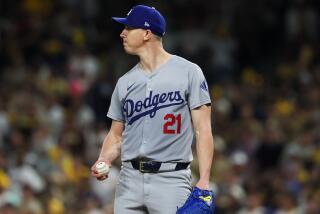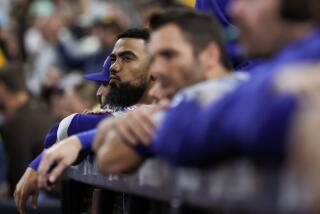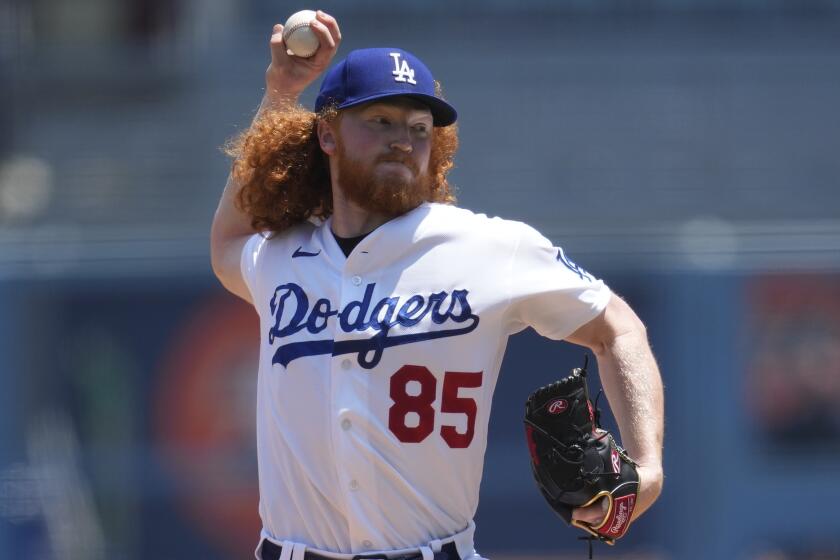Thereâs enough blame to go around for this Dodgers debacle
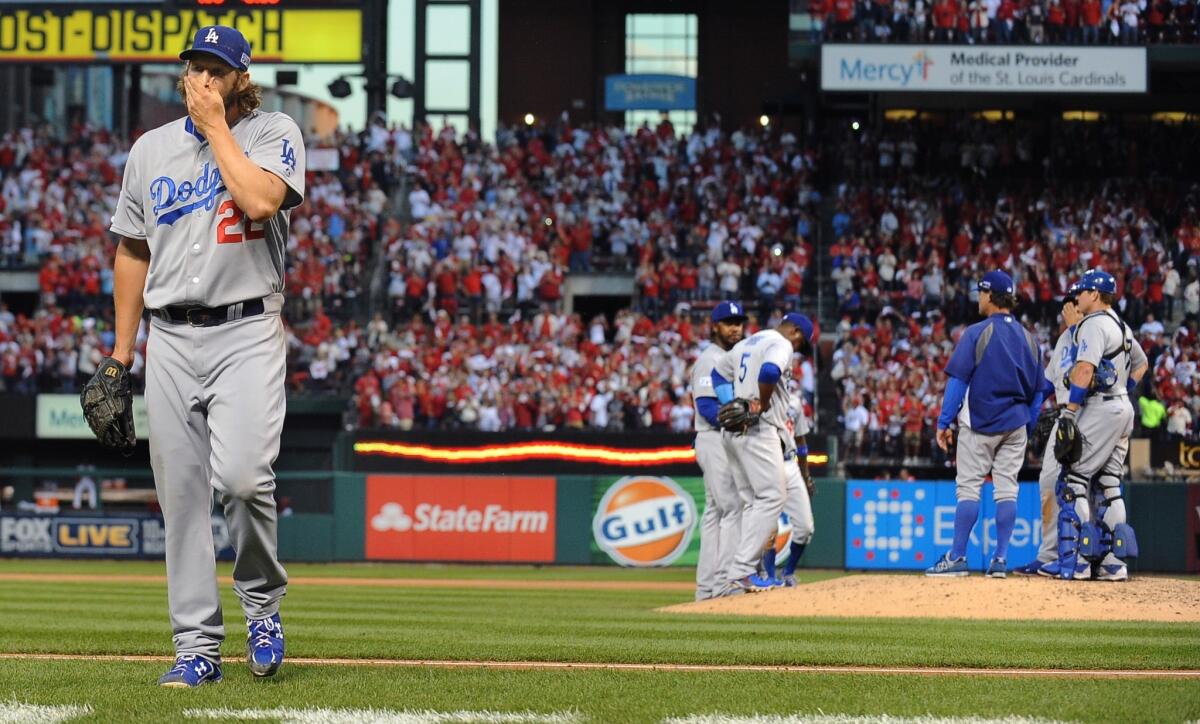
FROM ST. LOUIS â The failure ended with baseballâs best pitcher turning his back to home plate, dropping his hands to his knees and his head toward the ground, shadowed by a Gateway Arch that hovers over the Dodgers like a pendulum over a pit.
The failure happened here, again, the Dodgers being Busch whacked for a second consecutive postseason, eliminated again by a St. Louis Cardinals team that plays baseball like the San Antonio Spurs play basketball.
The failure sprinkled confetti on the heads of Dodgers trying to duck into their dugout, filled their vision with awkwardly dancing red birds, clogged their ears with chants of, ââYa-di, Ya-di, Ya-di.ââ
But the failure wasnât only in the Dodgersâ 3-2 loss to the Cardinals on Tuesday afternoon that ended their National League division series with a three-games-to-one Cardinals victory. The failure wasnât simply in Clayton Kershawâs surreal inability to survive a Cardinals seventh inning for a second consecutive start, or in Andre Ethierâs pained inability to judge a bouncing pitch while standing on third base, or the Dodgersâ inability to drive in two runners in two of the last three innings.
The failure was something much broader, much deeper, and much more evident in the Dodgers words than even their play. This was a 94-win team that was favored by many to traipse through October on its way to the World Series, yet their journey lasted all of five days. This was the ugliest postseason elimination for this franchise in 29 years, since the Cardinals did this to them in the 1985 National League Championship Series.
In a somber Dodgers clubhouse, you could see it, and you could hear it.
âItâs sickening, thatâs what it is,ââ Ethier said.
Standing next to him, A.J. Ellis kept shaking his head and staring at his packing teammates.
âItâs devastating more than anything,ââ Ellis said. âItâs sudden, abrupt, all the words you can think of.â
Across the room was Matt Kemp, still in uniform nearly an hour after the final pitch, looking as if he was ready to play another game.
âIt ended fast ,ââ he said.
Outside the clubhouse, helping to push one of the equipment trunks as if he were a batboy instead of chairman of Guggenheim Baseball Management, was a clearly distressed Mark Walter.
âThis is really hard,ââ he said, hurrying away. âI canât say anything right now.ââ
For the 26th consecutive Dodgers season, the World Series wonât be coming to town, and something needs to be said, and those words need to intially be about Walter and the ownership group, for this massive failure begins with them.
Guggenheim shamelessly hid the Dodgers from their fans this summer with a money grab from Time Warner Cable that prevented the team from being on television in 70% of Los Angeles households. Yet, for all the riches of that $8.35-billion contract, they refused to allow the trading of prospects for one simple arm that could have saved the Dodgers in October.
An effective starting pitcher would have prevented Kershaw from throwing Tuesday on three daysâ rest in a game in which he wearily gave up Matt Adamsâ three-run home run on his 102nd pitch.
An effective middle reliever would have allowed Manager Don Mattingly to relieve Kershaw not only before Adamâs home run, but also before Matt Carpenterâs three-run double sank Kershaw in the seventh inning of the series opener.
The team with the richest payroll in baseball history turned out to be a beautifully detailed Cadillac without any tires, a $240-million clunker that couldnât even finish the first October lap.
The failure continues with the baseball people, and that means General Manager Ned Colletti, who sat on a couch in the clubhouse early Friday evening and winced.
âItâs always hard when you donât win,ââ he said. âIt tears me up.ââ
Colletti will take most of the heat here for failure to work within his bossesâ philosophical constraints to somehow put together a group of decent relief pitchers. He is the one who rested the bullpenâs future in the veteran arms of former All-Star closers Brian Wilson, Brandon League and Chris Perez, yet only two of the three even made the postseason roster, and neither Wilson nor League were trustworthy enough to use.
âIt wasnât our bullpen that cost us this series,â Colletti said. âCould they have been better? Sure, but when you have left-handed Cardinal hitters doing what they do, thatâs unreal.ââ
The Cardinals indeed mocked baseball history with eight of their 10 run-scoring hits coming from left-handed hitters against left-handed pitchers. Quite unbelievably, the blast from Adams was actually the first time Kershaw had given up a home run to a left-handed hitter off his legendary curveball.
âGive the Cardinals credit, they are fine-tuned and they pick away at you,ââ Colletti said.
So why canât the same be said of the Dodgers? Why does this rich and powerful team so often play selfishly and distracted, particularly under pressure? Why are they, you know, the anti-Cardinals?
Adrian Gonzalez drove in a major league-leading 116 runs during the regular season, yet gave away at-bats and failed miserably to bring in runners from scoring position on three occasions in the final two postseason games. Dee Gordon was so worn down he had only three postseason hits. And throughout the series there was a visible lack of Dodgers leadership on the field when pitchers were struggling or Kemp was arguing with umpire Dale Scott, and nearly bumping him, all by himself.
The heat here falls on Mattingly, who, for a second consecutive postseason, didnât seem to have a firm grip on his team. He not only seems unable to steer their playing ethic, but he also still struggles strategically. Although Mattingly does not deserve to be ripped for not pulling Kershaw in either loss, he certainly didnât need to replace him in Game 3 with little-used Scott Elbert. And in a too-little-too-late move, he strangely benched Yasiel Puig on Tuesday, which meant Ethier had to make his fourth start in a month in the biggest game of the year. Little wonder Ethier ended the Dodgersâ only scoring rally in the sixth inning by getting lost off third base.
Mattinglyâs performance will be seriously evaluated, although he has the public backing of Guggenheim officials. Collettiâs performance will also be seriously evaluated, and, while he hasnât enjoyed that same public Guggenheim support, he has led the team to five postseason appearance in his nine years as general manager.
Everybody could be safe. Nobody could be safe. It depends on how much return Guggenheim believes it is receiving for its massive investment. Hereâs hoping Dodgers owners wonât forget to blame themselves, beginning with ending the television debacle before next spring.
âI think you look at the whole, as a season, and then you go back in and kind of cut up what you were good at and what you werenât good at,ââ Mattingly said.
No need to cut up the season, the Cardinals did that for them, once again leaving the Dodgers in sad little blue-stained pieces on their perfectly manicured turf with the arch cut into the outfield, the team that does everything right again triumphing over a team gone wrong.
Follow Bill Plaschke on Twitter @billplaschke
More to Read
Are you a true-blue fan?
Get our Dodgers Dugout newsletter for insights, news and much more.
You may occasionally receive promotional content from the Los Angeles Times.

